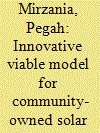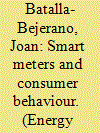| Srl | Item |
| 1 |
ID:
149884


|
|
|
|
|
| Summary/Abstract |
Whilst tariff-based approaches to load-shifting are common in the residential sector, incentive-based approaches are rare. This is so, even though providing customers incentives to shape their power consumption patterns has substantial potential. This paper presents findings from an exploratory UK pilot study that trials financial payments and detailed energy feedback to incentivise load-shifting of residential electricity consumption.
|
|
|
|
|
|
|
|
|
|
|
|
|
|
|
|
| 2 |
ID:
176749


|
|
|
|
|
| Summary/Abstract |
The current transformation of energy systems around the world is fundamentally a policy-driven process, unlike previous socio-technical transitions. This article focuses on the challenges of constructing forward-looking policies for sustainable energy transitions in the presence of powerful incumbent interests, through an in-depth study of how the emerging option of demand-side response (DSR) was incorporated into the Capacity Market (CM) for electricity in Great Britain over the period 2010 to 2014. Drawing on extensive documentation related to the development of the CM rules and interviews with participants and close observers of the process, the paper provides an unusually detailed assessment of the influence of companies with large electricity generation assets. The evidence presented supports the hypotheses that these companies had influence through deploying public facing strategies, that they had been able to draw on close networks of contacts and networks with senior policy makers, and that the latter had internalised the ideas and interests of the former. Despite counter-lobbying by DSR firms and non-governmental organisations, institutional arrangements gave major generators an advantage in terms of access. The paper concludes by recommending the establishment of independent bodies to propose policies and monitor the process of their development during energy system transformations.
|
|
|
|
|
|
|
|
|
|
|
|
|
|
|
|
| 3 |
ID:
175252


|
|
|
|
|
| Summary/Abstract |
The progressive withdrawal of the Feed-in-Tariff provided by the UK government has left community-owned solar photovoltaic projects facing significant financial challenges. They urgently need to develop alternative business models that will enable them to develop new projects and recuperate their costs in this post-subsidy era. One promising possibility is the incorporation of storage technology. However, currently it cannot be denied that the financial viability of this type of model is in question. This paper investigates whether and how integrated solar and battery storage system would be financially viable, using the System Advisor Model as a simulation tool to conduct techno-economic analyses.
|
|
|
|
|
|
|
|
|
|
|
|
|
|
|
|
| 4 |
ID:
176910


|
|
|
|
|
| Summary/Abstract |
This paper summarises the insights to be gained from a systematic literature review of empirical research devoted to behavioural considerations associated with the use of smart meters and energy information feedback. Above and beyond the mass rollout of smart meters, there are various behavioural considerations that can affect the way in which consumers react to information enabling the adaptation of their consumption behaviour in response to dynamic pricing. Indeed, many empirical studies have been conducted in various countries aimed at determining how consumers respond to feedback on their consumption and prices. However, if users fail to demonstrate a pro-active attitude, they cannot hope to take advantage of the opportunities afforded by new technologies. By reporting a systematic analysis of bibliographic references, this article seeks to further understanding as to why consumers behave as they do when managing their demand, a process that, ultimately, is for the benefit of the electrical system, in particular, and of the whole of society, in general. The policy implications that emerge from our analysis highlight the heterogeneity of consumer engagement in demand management programs, depending on the degree of preference satisfaction achieved by means of personalised contract terms and the degree and persistence of consumer change, which are dependent on the cost, frequency and quality of information.
|
|
|
|
|
|
|
|
|
|
|
|
|
|
|
|